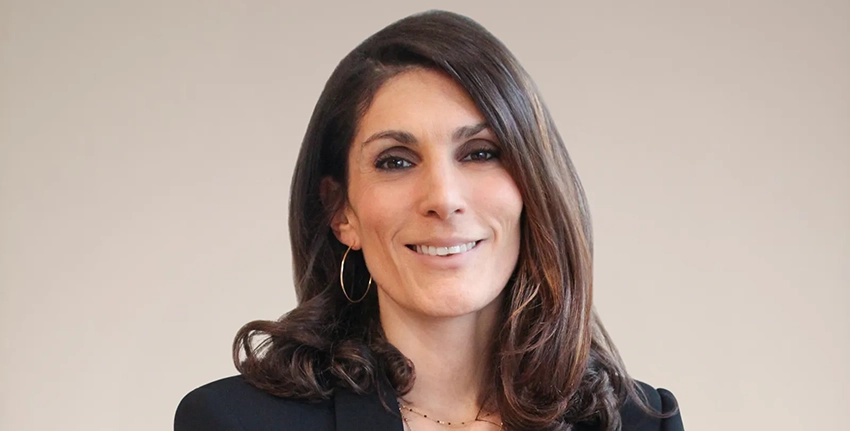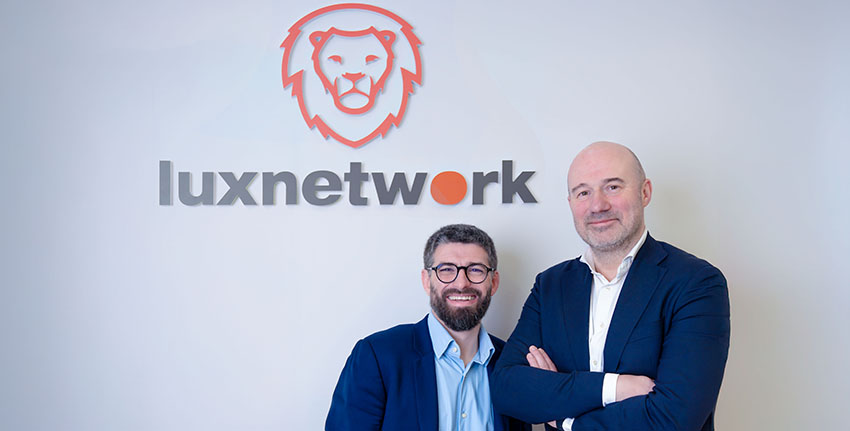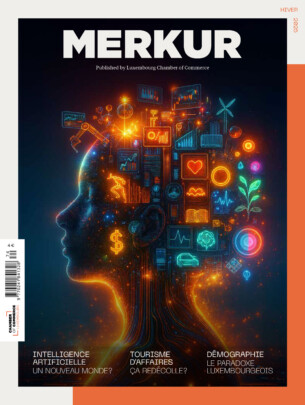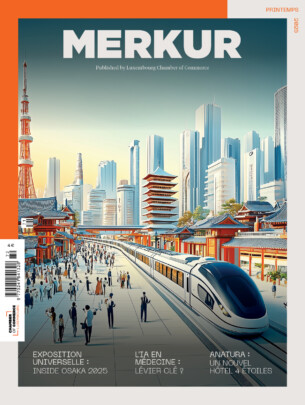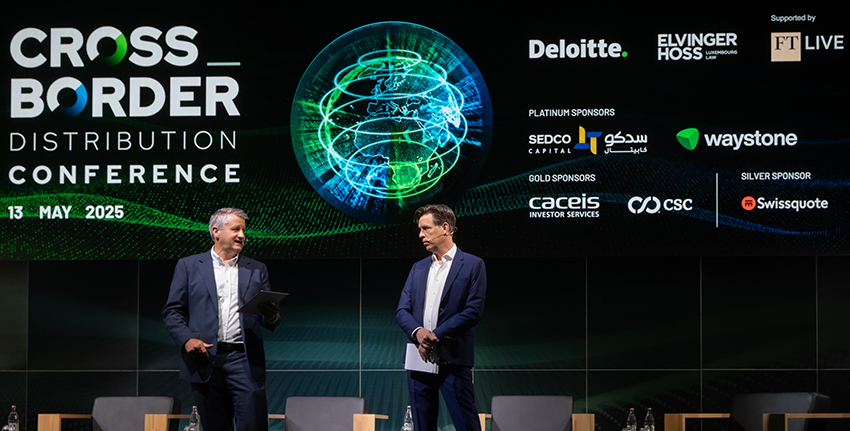
Justin Griffiths, Partner, Deloitte Luxembourg, and Jérôme Wigny, Partner, Elvinger Hoss Prussen.
The 2025 Cross-Border Distribution Conference gathered regulators, leading asset managers, and industry experts, to explore the evolving future of cross-border fund distribution.
On Tuesday, 13 May, Deloitte Luxembourg and Elvinger Hoss Prussen, with the support of Financial Times Live, hosted their annual Cross-Border Distribution Conference at the European Convention Center in Luxembourg. This 13th edition focused on identifying new avenues for growth opportunities amid geopolitical challenges.
Geopolitical and economic challenges take centre stage
A central theme of the conference, introduced by the hosts Justin Griffiths, Partner at Deloitte Luxembourg, and Jérôme Wigny, Partner at Elvinger Hoss Prussen, was navigating geopolitical instability and its ripple effects with subsequent impact on global markets. Experts examined the impact of neoliberalism, trade wars, and military tensions on European security, transatlantic relationships, and the global economy.
Renowned economist Dr. Bruno Colmant delivered a powerful opening keynote, tracing the trajectory of neoliberalism over the past 40 years. He explored its rise to global dominance and eventual unravelling in the face of today’s fractured economic order, setting a compelling tone for the day’s discussions.
The panel on geopolitical volatility was moderated by Yuri Bender, from the Financial Times. The three panellists, Yves Choueifaty, President and CIO at TOBAM, Anna Rosenberg, Head of Geopolitics at the Amundi Investment Institute, Maximilian Hess, Founder of Ementena Advisory, and Anunita Chandrasekar, Fellow at Centre for European Reform, discussed potential flashpoints and their implications for the European fund industry, emphasising the importance of resilience and adaptability in today’s unpredictable environment, and ongoing political tensions.
Dr Judith Arnal, Associate Senior Research Fellow at Centre for European Policy Studies, and Dr Holger Schmieding, Chief Economist at Berenberg, provided valuable insights on Europe’s economic future. They focused their exchange on policies, productivity, and investments essential for strengthening Europe’s global competitiveness amid shifting geopolitical and industrial landscapes. The discussion also evaluated how Europe is poised to attract more talent in light current global dynamics. Additional recommendations and measures were presented within the Draghi report on European Competitiveness, on how to further bolster Europe’s position on the global stage alongside China and the US.
“As geopolitical developments continue to influence global markets, growth will depend on the industry’s ability to adapt, innovate, and collaborate across borders.” explained Jérôme Wigny, Partner at Elvinger Hoss Prussen and co-host of the conference. “The 2025 Cross-Border Distribution Conference in Luxembourg is dedicated to helping asset managers and policymakers navigate these shifts and seize new opportunities for sustainable growth. It is important to us to host this essential forum once again, reinforcing Luxembourg’s role as a hub for dialogue, insight, and leadership in cross-border fund distribution.”
Highlighting technological innovation and investment strategies
One of the key presentations featured Abdulwahhab Abed, CEO of SEDCO Capital, who assessed the growth potential of Shariah-compliant investing and dispelled common misconceptions around its costs and target markets. He emphasized that this investment approach is not only viable, but also well-positioned to lead the future of ethical, liquid, and scalable finance—already representing nearly three trillion dollars and projected to reach eight trillion by the 2030s. The panel further highlighted the increasing interest among foreign investors in accessing Saudi markets and products.
The panel featuring Sandra Daub, Member of the Executive Board of NOUMENA Digital, Sharmil Patwa, Founder of Opus Una Financial Services Consulting, Gaurab Arka Chaudhuri, Group Strategy Director at Barclays, and Stela Willemstein, Group Risk Control Director at UBS AG, explored how Millennial and Gen Z investors—digital natives with evolving expectations around transparency, personalization, and accessibility—are driving digital transformation in asset management. They underlined the importance of balancing technological innovation with robust security measures to address the challenges posed by AI, blockchain, and robo-advisors, which are not only transforming service delivery but also reshaping risk management, compliance, and decision-making structures within financial institutions.
“Trust and accessibility are essential for fully harnessing the potential of technological advancements in the asset management industry,” emphasised Justin Griffiths, Partner at Deloitte Luxembourg. “As we continue to integrate digital tools and platforms, ensuring that investors feel confident in the security and integrity of their transactions becomes crucial. Cybersecurity is no longer just an operational concern—it is now central to the industry’s strategic success and long-term stability. Without it, the promise of innovation is undermined, and the ability to scale new technologies in a secure, accessible way is compromised. Building this trust will be fundamental as we move forward into a more digital and interconnected financial landscape.”
Navigating regulatory changes and market liquidity
Mhairi Jackson, Funds and Asset Management Policy Manager at Financial Conduct Authority (FCA), provided a comprehensive analysis of recent and forthcoming UK regulatory developments affecting cross-border fund distribution. She outlined the FCA’s decision to maintain alignment with the EU UCITS framework in response to industry feedback, while signalling a shift towards regulatory divergence through the ongoing consultation to reform the UK AIFM regime. The UK’s earlier departure from the ELTIF framework via the creation of long-term asset funds (LTAFs) was also noted, alongside notable progress in processing UCITS applications under the Overseas Funds Regime (OFR). The direction of travel regarding the extension of UK Sustainability Disclosure Requirements to OFR-marketed UCITS remains uncertain, as the current Government may consider a different approach from its predecessor while also noting the EUs intention to review the current SFDR framework.
Sanjiv Sawhney, Group Chief Executive Officer at Waystone, expertly moderated discussion around the role of open-ended fund structures in increasing liquidity, enhancing access, and fostering global fund distribution. Véronique Fournier, Head of EMEA at Apollo Global Management, Neil Hoyne, Head of International Client Services at Ares Wealth Management Solutions, Bertrand Coste, Partner at Clerville Investment Management, and Tim Boole, Head of Product and Solutions Management at Schroders Capital, explored how Europe can close the gap with the US in private asset distribution. Fournier strongly advocated for increased collaboration and strategic partnerships as means to foster a more integrated European market. The panel underscored the importance of capitalising on Europe’s robust regulatory framework, dynamic financial ecosystem, and rising investor demand. Luxembourg was highlighted as a key player with the potential to become a hub for innovation and cross-border growth in private assets. While the panellists recognised persistent challenges, such as regulatory complexity and liquidity constraints—they agreed that the European private assets landscape offers compelling opportunities for long-term investors.
Emma Dunkley, from the Financial Times, moderated a panel featuring Arnaud Gebhart, Head of International ETF Platform at J.P. Morgan Asset Management, Matthieu Guignard, Global Head of Services and Solutions at Amundi, and Marie-Sophie Pastant, Head of ETF/Index & Systematic Synthetic Strategies Portfolio Management at BNP Paribas Asset Management. The panel reviewed the significant evolution of the Exchanged Traded Funds (ETFs) and the strong growth in actively managed ETFs, the drivers behind the growth and the role that ETFs play in composing investment portfolios.
Cross-sector insights on collaboration and resilience
In a captivating session, Ruth Buscombe-Divey, Formula One Race Strategist, riveted the audience with insights from her decade-long career with Ferrari, Alfa Romeo, and Haas.
In her keynote, she spoke about leading under pressure, the psychology of decision-making in high-stakes moments, and how marginal gains and data-driven strategies can make or break a race. She also explained how cutting-edge AI innovation, for example “close to the wall”, is being deployed in Formula One, emphasizing its critical role in performance optimization, and predictive analytics, demonstrating how these types of environments are pushing the boundaries of AI application in elite motorsport. She continued to explain that human expertise is a indispensable part of the ecosystem, one that can make the difference between winning and losing. She closed her keynote offered compelling insights into resilience, innovation, and teamwork in a sport where every millisecond counts.
In his fireside chat, General Sir Patrick Sanders, former Chief of the UK Army, shared rare insights into Europe’s evolving security landscape amid rising global instability. Drawing on four decades of strategic leadership, he examined the long-term implications of the war in Ukraine—not only for regional stability but for the broader geopolitical order—and emphasized the escalating threat to Europe’s sovereignty. He underlined the necessity for Europe to adapt, be resilient and act collectively rather than individually, as Member States. He also highlighted the significance of adopting technology and innovation in modern warfare. This discussion provided a timely and thought-provoking perspective on defence, resilience, and insights into the crossroads between security and markets.
Closing thoughts
As echoed in the sentiment that adaptability, rather than strength or intelligence, determines survival, the 2025 Cross-Border Distribution Conference underscored the importance of strategic flexibility in addressing global challenges. Experts offered perspectives on the geopolitical landscape, technological innovation in fund distribution, and cross-sector insights on collaboration, fostering dialogue to pave the way for sustainable growth and resilience in the years ahead.
For further insights from the conference, including keynote speeches, panel discussions, and interviews on various fund-related topics, please visit: https://www.cross-border.lu/

